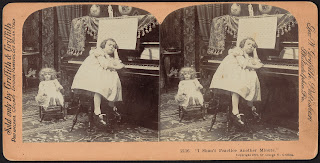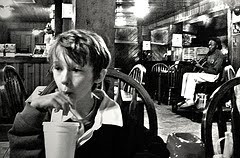 What with her sweet new baby (right), and all, my sister and I had been talking a lot about attachment... and by natural extension, attachment disorders, and how easily you can find examples in the wild.
What with her sweet new baby (right), and all, my sister and I had been talking a lot about attachment... and by natural extension, attachment disorders, and how easily you can find examples in the wild.She asked, rhetorically, 'why is it that the parents who spent the kid's whole childhood pushing the child away, arranging daycare and babysitters and ordering the child outdoors, or at least into distant rooms, are also the parents who complain endlessly that their adult children don't have time for them and never call or write?'
Cue the smirk.
 Is that not the apparent goal of every parent who celebrates
Is that not the apparent goal of every parent who celebrates ~ the first day of school
~ the first day back to school after any break or long weekend
~ or who laments the cost of boarding school
~ or who threatens that social services or the police will come and take the kids away and give mum a 'break'
Is it not clearly their goal to keep the children as far away as possible, for as long as possible?
Does it strike anyone but me that it's a tragedy that so many 'normal' parents are working diligently toward goals they do not wish to achieve?
They accomplish this through the very simple process of mindlessly doing what all the rest of the 'normal' parents seem to be doing.
 Following the advice all the 'normal' parenting experts, those warning parents to comply lest they fall prey the evils of permissiveness, cause arrested development or, horror of all horrors, 'losing themselves.'
Following the advice all the 'normal' parenting experts, those warning parents to comply lest they fall prey the evils of permissiveness, cause arrested development or, horror of all horrors, 'losing themselves.' And daily, moment by moment, walking further from the goals they do wish to achieve.
Even way back in the dark ages (1974), when Sandy Chapin wrote the poem, which became the lyrics to Harry Chapin's Cats Cradle, at least one person recognized the path taken when the son's need for his father is dismissed for decades only to be supplanted by the father's need for the son.
Richard Carlson, author of Don't Sweat the Small Stuff, had a brilliant insight as a father, regarding the insidious idea of 'me-time': why would I actively avoid spending time with the people I love most in the world?
How is spending time with the people we love anything but me-time?
And, because I'm in a noticing kind of frame of mind, I just noticed that this whole 'me-time' necessity has been created entirely by the current generation of parents and parenting experts who are bleating on about how this generation of youngsters have the most outrageous sense of entitlement ever... hmmm...
Spend a week pushing a child away because you have more important things to do, and you'll have some work to catch up on when you're free --to re-connect and reassure and just be together to establish a relationship with this child who has now had 168 hours of development without your presence.
Spend a month 'too busy' and you find yourself facing a changed child who is no longer someone you can predict accurately, and whose cues and communication have changed from the last time you met.
Spend a year away from a child and you will encounter a different person. Spend a child's childhood away and you will be facing a stranger, who you might remember used to like a particular colour or didn't used to want to eat a specific food, but who now you do not know at all.
From the small child's point of view, the week is a serious problem, the month is traumatic, a year is everything he can remember and his whole childhood: even if he feels a bit guilty about his natural resistance to approaching his parents, his natural resistance is based entirely in a lifetime of rejection.
Barbara Coloroso so deftly recommends: spend time with your children while they're still young and want to.










































